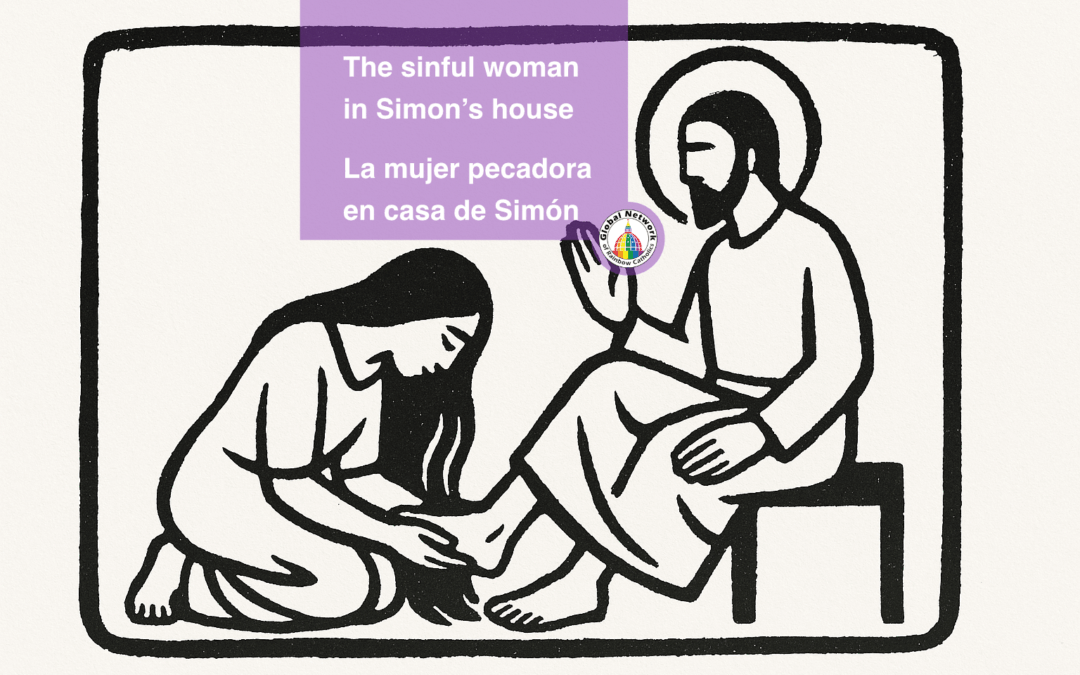Text available both in english and Spanish
Texto disponible en inglés y en español.
→ English Version
The following is a personal contemplation on the Gospel of Luke (7:36–50), born from a deeply lived prayer experience in the Ignatian spiritual tradition. It reflects the practice of imaginative meditation, in which a person enters the Gospel scene with heart, senses, and imagination, identifying with the characters in order to be transformed by the Word.
The narrative is written in the first person, from the perspective of the woman who anoints Jesus’ feet in the house of Simon. But it is not a narrative exercise, nor a performance. It is a prayer embodied. An interior experience of grace and salvation, brought to the surface through words marked by sincerity and emotion. The author is a Spanish trans woman, a member of GNRC, who lived this meditation during a recent journey of Spiritual Exercises. With generosity, she chose to share it—not to seek attention, but to offer a space of resonance for anyone who, while reading, might open themselves to this scene, this voice, this gaze.
I heard that Jesus of Nazareth is dining at Simon’s house. I’ll have no trouble getting in—Simon is a regular client of mine, and I’ve been there many times. I’ve bought a jar of perfume for Jesus, and this is the right moment to give it to him. I bought it to thank him, because a few days ago I met him, and I asked him to heal me from my guilt. He looked at me, touched me, spoke to me, and forgave me. No one had ever looked at me like that before. No one had ever spoken to me like that. No one had ever treated me like that. He made me feel worthy, made me feel good, made me feel saved—not a sinner.
He looked at me with love and said, “Don’t worry, your sins are forgiven.” And I, who was expecting something, but not everything, was left stunned and speechless. He went on healing and tending to others and eventually walked away. But when he left, I thought the least I could do was give him a gift. A great gift, to match the one he had given me. That’s why I bought the perfume—it cost me a fortune, but it’s nothing compared to what he gave me.
Now that I know he’s eating at Simon’s house, I can’t let this chance slip away. I entered with determination, and no one stopped me—as I said, it was a house I knew well. I reached the dining room and saw him, eating and talking cheerfully. I didn’t want to distract or disturb him—only to express my gratitude. So I came up from behind and, falling at his feet, I began kissing them and pouring perfume on them. But I couldn’t hold back my tears—tears of joy, remembering our earlier encounter. And I cried, ruining the perfume, trying to dry the tears, but I had nothing at hand—so in desperation, I used my own hair. And I stayed like that for a long time, pouring perfume and washing Jesus’ feet with it and with my tears.
Then I thought, surely I must be making a scene with my sobbing, and I was disturbing him. My plan had only been to anoint his feet and kiss them, just like I had done with many other men when we were done. But these tears of mine, this feeling I have when I see him and remember what happened—how he looked at me, how he spoke to me, how he cared for me… I’m a fool, unable to repay good with good, and I ended up bothering him.
Then he stood up and said: “Simon, I have something to say to you. A creditor had two debtors. One owed him 500 denarii, the other 50. Neither could pay, so he forgave both. Which of them will love him more?” And Simon replied, “I suppose the one who was forgiven more.” And he said, “You have judged rightly.”
Then he looked at me and said, “Do you see this woman? I came into your house and you gave me no water for my feet. But she has wet my feet with her tears and dried them with her hair. You gave me no kiss, but from the moment she came in, she has not stopped kissing my feet. You did not anoint my head with oil, but she has anointed my feet with perfume. Therefore I tell you: her many sins are forgiven—because she has shown great love. But whoever is forgiven little, loves little.” And then turning to me, he said: “Your sins are forgiven. Your faith has saved you. Go in peace.”
Good thing I had no more tears to cry, or I would have truly made a scene. I stood up—with all the dignity I could muster, with all the dignity He had given me. And I felt the eyes of everyone fixed on me. For the first time—and thanks to Him—they saw me. They recognized me. They knew my name: Magdalene, even if they didn’t dare to say it out loud.
I had entered that room in secret, I had approached Jesus from behind. I was grateful and wanted to show it. But I walked out of there with my head held high, feeling how everyone saw me and respected me. All thanks to Him. No greater miracle could ever exist. Thank you, Lord, for everything.
Contemplation based on Luke 7:36–50 – The sinful woman in Simon’s house
—————————————————————-
→ Versión original en español
Lo que sigue es una contemplación personal sobre el Evangelio de Lucas (7,36–50), fruto de una experiencia de oración profundamente vivida dentro de la tradición espiritual ignaciana. Refleja la práctica de la meditación imaginativa, en la que la persona entra en la escena evangélica con el corazón, los sentidos y la imaginación, identificándose con los personajes para dejarse transformar por la Palabra.
El relato está escrito en primera persona, desde la perspectiva de la mujer que unge los pies de Jesús en casa de Simón. Pero no se trata de un ejercicio narrativo ni de una representación. Es una oración encarnada. Una experiencia interior de gracia y salvación, aflorada a través de palabras marcadas por la sinceridad y la emoción. La autora es una mujer trans española, miembro de GNRC, que vivió esta meditación durante un reciente recorrido de Ejercicios Espirituales.
Con generosidad, ha querido compartirla—no para buscar atención, sino para ofrecer un espacio de resonancia a quien, al leer, quiera abrirse a esta escena, a esta voz, a esta mirada.
—


